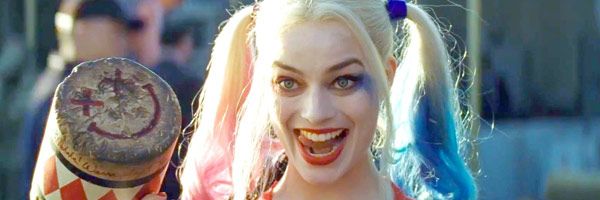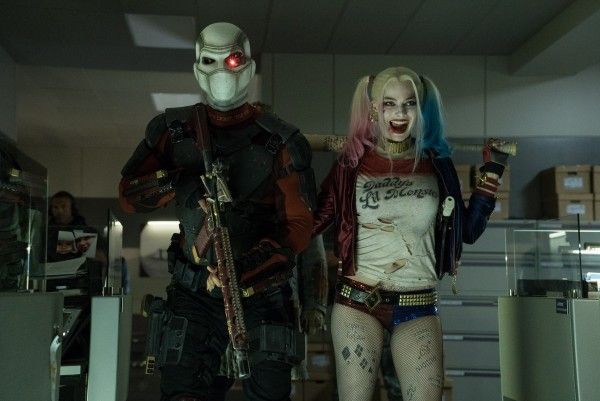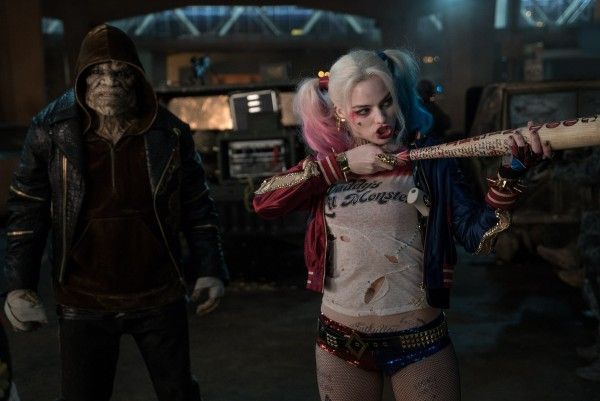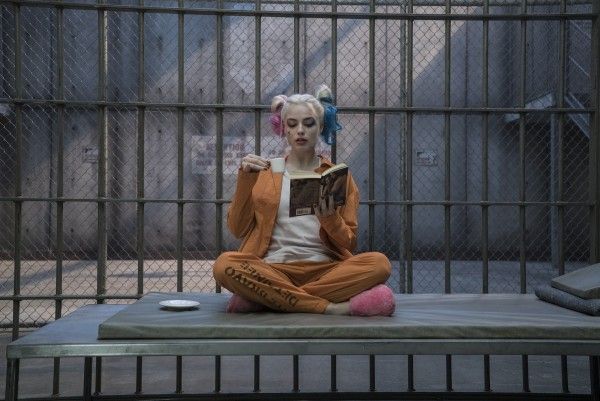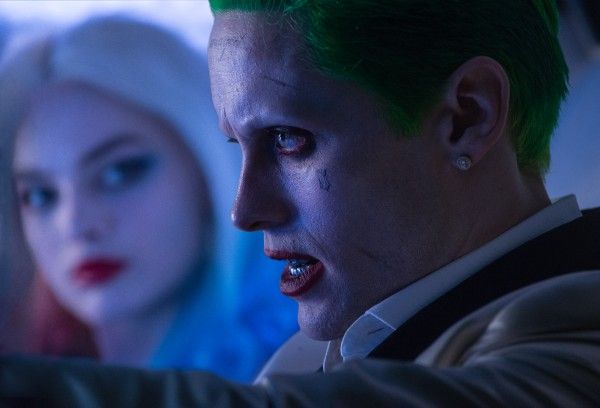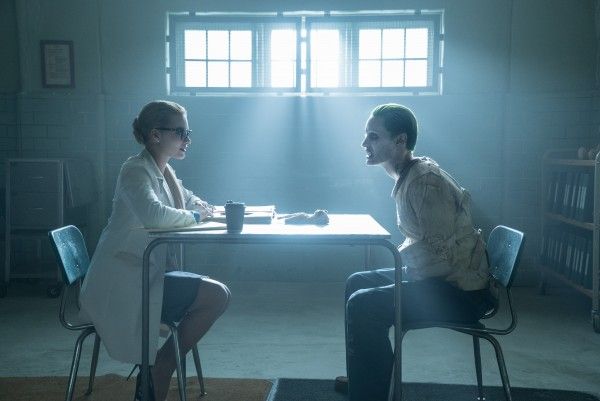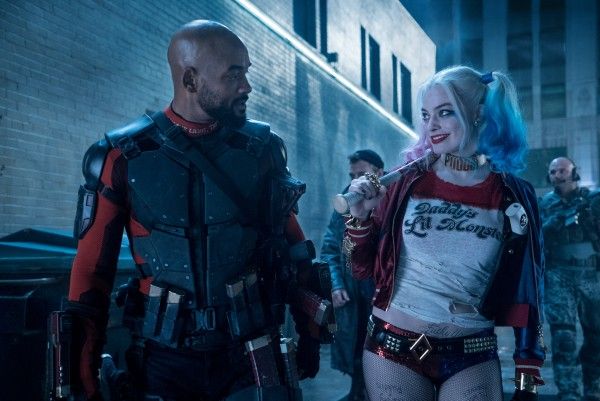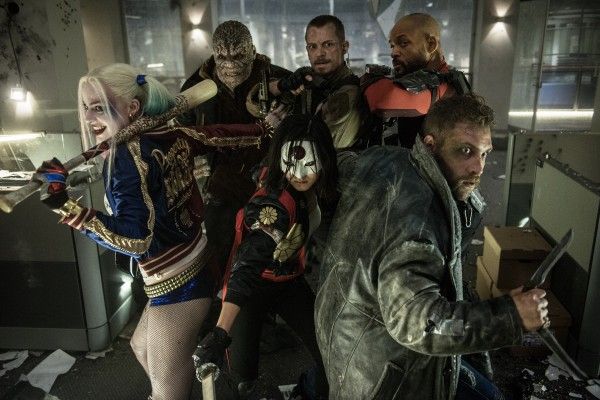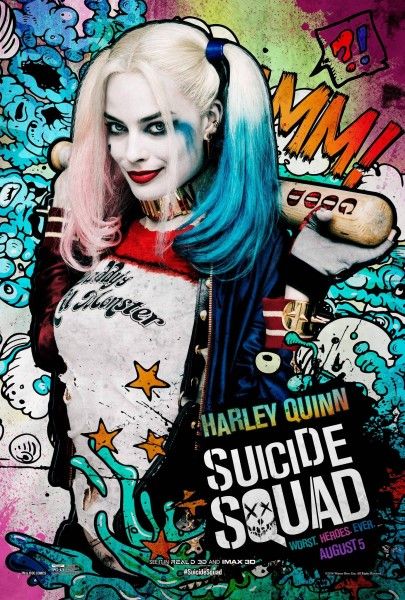Please be aware there are spoilers for Suicide Squad.
"Own that shit! You own it."
At the end of Suicide Squad's second act, as Jay Hernandez's Diablo confesses the great sin that led him to swear off his powers, Margot Robbie's scene-stealing Harley Quinn barks at him from across the bar. "Own it," she demands, unphased by Diablo's heartfelt admission of one of the most horrific crimes conceivable. And that's the epitome of the Harley Quinn we meet in Suicide Squad. A barb-tongued spitfire with chutzpah to spare; whatever nastiness comes her way, whatever her damage is, she owns that shit. The only problem is how poorly that damage is defined and how routinely it's exploited in favor of a glamorized portrait of a brutally abusive relationship.
Suicide Squad is plagued by a host of problems. Incomprehensible narrative choices, chaotic editing, and a mish-mash of tones make for a pretty bad movie that's frustratingly close to being pretty good. Structural issues aside, Suicide Squad boasts enough engrossing performances (Will Smith and Viola Davis unsurprisingly delight, while Hernandez is an unexpected standout) and off-beat character moments to keep me happily glued to my seat. And even if the story is somewhat mangled, there's a lot to love about the rag-tag band of black sheep who forge a new family in the thick of battle. While I had higher hopes for Suicide Squad, it would have been enough. It would have been enough but for the fact that the film is almost uniformly terrible to women, and to Harley Quinn in particular. And as a female viewer, it's absolutely disheartening to watch.
Growing up as an action and genre junkie in the 90s, I got pretty well adjusted to skewed gender dynamics in film. Excepting a few oddballs (The Long Kiss Goodnight, Point of No Return), it was all but a given that the leading men would serve as hero and female characters would come up as second best...at best. More often, they were pale, sexist portraits of vixens and damsels, rarely afforded the integrity, intelligence, and determination of the male characters that surrounded them. Which is to say, I learned early on to be able to enjoy a film and be offended by it at the same time (there's literally no other way to be a fan of James Bond if you're a woman). But decades have passed. Female action heroes have become the norm. And while that kind of sexism still lingers, it's usually a lot more subtle than what we see in Suicide Squad.
Amanda Waller is admittedly a triumph, but from there things get pretty grim for the women of Suicide Squad. June is a frustratingly feeble non-character, Enchantress is a gyrating emblem of tribalism, and for some reason, Katana isn't allowed to speak for herself despite the reveal that she's fluent in English. Women are regularly used as literal punchlines, and even the female characters on the periphery are deadbeats (Deadshot's wife) and plot points (Diablo's wife). To put it bluntly; it's 2016, we expect better. We deserve better. And so does Harley Quinn.
Robbie's Harley Quinn is a gleaming bright spot in a largely disappointing film. A constant source of chaotic fun, she's the one element in Suicide Squad that truly delivers on the advertising campaign's promise of an irreverent, candy-colored bad-guys-gone-good time. In an ensemble full of magnetic performances, she manages to steal the show. She even gets the biggest laughs in a movie that features Will Smith delivering his one-of-a-kind movie star charisma on full blast. But, in a huge misstep for a character that could become a linchpin of the DCEU, she is routinely undermined by a narrative that fetishises and victimizes her from the get-go. Robbie's triumph is that this is the most adult, relatable, and realistic spin on the Puddin-obsessed anti-hero we've ever seen, and she's brimming with life thanks to a grinning, infectiously maniacal performance. But that tremendous work is done a great disservice by the lean portrait of, not only the character herself, but the toxic, yet enchanting relationship that has long defined her.
Harley Quinn is famously a breakout phenomenon. Intended as a one-off character created by Paul Dini and Bruce Timm for Batman: The Animated Series, Harley was designed as a goofy, theatrical henchman to The Joker, introduced in the 1992 episode "Joker's Favor". A standout against the usual roster of Joker's faceless goons, Harley stuck in the minds of her creators and fans alike. What began as simplistic devotion to her ringleader became a twisted, cruel joke of a love story in Dini's 1994 comic Mad Love, the fan-favorite comic that chronicled Harley's slow slip into madness as The Joker coerced and manipulated her into an unshakable obsession. From there, the relationship between the two gleefully amoral villains became a portrait of the push-pull power dynamics that define abusive relationships. Modeled after real-life cycles of abuse, Harley conformed herself to the image of the man she desired. She demolished her whole life and identity in pursuit of that relationship, abandoning her better judgment in favor of his affection. The Joker was alternately dismissive or lavishing her with attention. He would lash out at her violently and cruelly, and in moments of clarity (best depicted in the exemplary episode "Harley and Ivy"), she would strike out on her own. But inevitably, the pull was always too strong. Sometimes The Joker concocted elaborate ways to reclaim her, sometimes she made the move, but she always returned. And it was always her choice. Subsequent incarnations of Harley both upped the existing sexuality of the character and called her agency into question – most notably in the controversial New 52 rewrite of her origin that saw the Joker shove her into a vat of acid, turning the story from one about a good girl who chooses to turn bad for a man she loves (and relishes that villainy, no less) into one about a plaything created by a madman against her will.
Suicide Squad splits the difference. She still plummets into a vat of acid, but this time, she makes the choice to jump rather than being pushed off the ledge. "Will you live for me?" The Joker asks after deciding dying would be too easy. "Yes," she promises; begging "please" for the opportunity to prove her love before freefalling off the edge. But, and this is a big but, she makes the choice after having her brain zapped to bits in an intensive round of electrotherapy, courtesy of Mr. J himself. The result is, unfortunately, a narrative that makes her entirely a construct of The Joker's design. This Harley, as we know her, is defined by their relationship. We don't get a sense of who she was before they met, other than a wide-eyed, foolish girl bringing stuffed kittens to a man who wants machine guns. If there's a single quality we can discern in pre-transformation Harley, it's that she was bafflingly stupid. We don't see her ambition or her vulnerability, or any of the pieces of herself that she lost in her carnal contract with the Clown Prince of Crime. We only see what remains of her after she's been reshaped in his image, becoming a hand-crafted mirror reflection of his madness. Harley literally wears that ownership on her sleeve -- or more accurately the back of the jacket that sleeve is attached to, where "Property of the Joker" is broadcast in big white letters across the back. It's also advertised on her tattered baseball tee and her gold statement-piece choker. From her origin to her appearance, Harley's entire existence is framed through The Joker's ownership and authorship of her -- and she never once calls it into question. Previous incarnations of the character have faced moments of internal conflict when she confronts how cruel her beloved Mr. J can be. This Harley isn't even afforded that self-awareness.
Most upsetting is the rose-colored lens through which the film presents that wildly abusive relationship. Suicide Squad has a lot of threads to dangle and a lot of characters to service, but it would have taken only a few extra minutes to offer some insight into the seduction that pulled Harley from the edge of sanity into their Mad Love. Without that context, without letting us understand how and why she fell under the influence of such an obviously dangerous man, the relationship takes on a (even more) disturbing tone. The heady moments of love drunk bliss in co-dependent relationships are only so powerful because of the intoxicating fix they provide to a deep emotional addiction. Suicide Squad is all fix, and no withdrawal, only depicting the frenzied passion without framing it in the systematic, isolating build-up that precedes it or the blinding moments of desperation that follow. We see moments of The Joker's cruelty, but we never see Harley struggle with them and his moments of sadism are constantly rewritten as soon as they happen. He almost leaves Harley to die in the factory, but runs back to save her. He abandons her to be captured by Batman, but spends the rest of the film trying to break her out. He pushes her out of a helicopter, but only to save her from an explosion. His callous acts are constantly forgiven before they're given time to resonate. Instead of digging into the meat of what makes an abusive relationship tick, their love affair is depicted with a thinly-veiled BDSM tinge. From the grating use of "Daddy" to the way The Joker offers her up as a shared sex toy, their relationship takes on a hypersexual dynamic that would be intriguing if it didn't so plainly eroticize abuse. At the same time, through his affection for Harley, Jared Leto's Joker becomes the most sympathetic incarnation of the character we've seen on film. And in a disturbing way, even as her abuser, he's positioned as a white (or green) knight, swooping in time and again to rescue his whacky damsel. For all his villainy, he's too heroic and too easily forgiven.
In a final twist of the knife, Suicide Squad reveals that Harley's greatest desire is to play suburban housewife to a reformed Joker, stripped of all the intoxicating insanity that defines them. A woman who abandons the security of a promising medical career to cavort alongside a murderous madman -- a woman who tattoos her face in that madman's image and licks her lips at the prospect of heavy casualties -- is not a woman who dreams of white picket fences. If there's one thing Harley's never been, it's vanilla. To reduce Harley Quinn's greatest ambition to Nancy Meyers-flavored domesticity is to undermine all the delicious, hot-blooded madness we've come to love from Gotham's queen of the criminal underground. Perhaps saddest of all (if Reddit is to be believed) is that earlier cuts of the film might have remedied some of these problems, digging deeper in the origins of their love affair, and painting Joker as the impetuously cruel character we know he can be. But the good news is that there's plenty of opportunity for the ship to be righted. Suicide Squad is a box office smash, charting way better with moviegoers than critics. You can rest assured there are future adventures for Harley and the Squad, and most exciting of all, a standalone Harley Quinn film is reportedly already in the works. God willing, that movie will show us why Harley loves The Joker with all the nasty bits intact, let us see her hurt from it, let us see her chose to love him anyway, and let us see her stand on her own. For the moment, the DCEU's Harley is a diamond in the rough. There's no doubt Margot Robbie gets Harley Quinn, she just needs a movie that gets her too.

